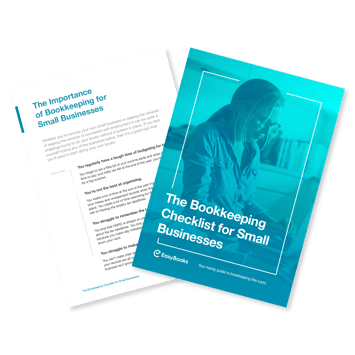Bookkeeping is important but often overlooked by busy small business owners. It may seem easier to outsource but there’s nothing stopping you from successfully doing your own books.
Here are some super simple tips to follow on how to do bookkeeping for a small business:
- Don’t Outsource Your Bookkeeping
- Keep Those Relevant Receipts
- Take Action on Your Accounts Receivable
- Don't Mix Business With Personal
- Make It Easy With an App
1. Don’t Outsource Your Bookkeeping
As a small business owner, you probably need to be an expert in every department and fast. Bookkeeping can often get lost amongst all the other crucial tasks. It happens - but the importance of bookkeeping doesn’t go away.
Outsourcing your business bookkeeping means handing over all your important accounts and financial reports to somebody else. Not having everything accessible might present issues down the line, you won’t have answers immediately and you’re limited to work hours.
Although it may seem cost-effective to outsource, it’s quite the opposite. With any paid service, it’s not uncommon to have sneaky hidden costs. Not only that but because you don’t have eyes on your financial records as often, you may also feel that you’re losing oversight of expenses in the business.
The reality is that you don’t have to be a professional bookkeeper when there’s software out there that’s designed to make the task simple. Needing lots of experience in finance is no longer true, especially when you have an easy-to-use app.
2. Keep Those Relevant Receipts
It may seem silly but this tip could save you a lot of money down the line. Making sure all your business expenses are accounted for is important. It may be wise to make extra digital copies to ease tax-time issues.
Failure to present evidence when HMRC asks will mean your expenditure isn’t supported and you can’t claim back any expenses.
3. Take Action on Your Accounts Receivable
First things first, establish payment terms with your customers so they know when to pay-up. There’s no point in chasing for money if your customers are unaware of the timeframe and terms.
It can be stressful as a small business owner, especially in the early days. When a customer pays late, it can have a knock-on effect on the rest of your business. It’s best practice to chase overdue payments immediately so you can set the standard for any more purchases they make and get your books in order.
4. Don't Mix Business With Personal
You’re playing a risky game if you mix your business and personal expenses. Not only do you make it harder to fix later when preparing your tax return but you also run the risk of a fine if you accidentally write off a personal purchase.
A good way to keep the two separate is to open a business account in the beginning. This ensures all of your personal spends don’t get lost in important business expenses. You don’t want to miss out on any beneficial tax write-offs because your bookkeeping was disorganised.
If you have more than one business, using software that can display them all would be ideal. Remember, bookkeeping is hard if you let it be hard.
5. Make It Easy with an App
Arguably the most important tip - you can access and organise all your bookkeeping via an app on your phone now. Sorting through piles of invoices and receipts in preparation for tax time can all be a distant memory.
It’s okay to leave manual bookkeeping in the past, especially with the Making Tax Digital (MTD) initiative coming in to play. It makes sense to have everything finance related at the click of a button and simplified.
Clean and correct records are vital when it comes to making smart business decisions. Inaccurate bookkeeping can lead to fines and stress, not to mention the repercussions it will have on your finances. So, if you could make it easier for yourself and your business, why wouldn’t you?
Bookkeeping’s Best Kept Secret - Checklist for Your Small Business Books
You’re armed with some tips and you’re ready to take on bookkeeping yourself. You’re no longer a beginner at your books so take the next step and gain some insider knowledge on doing bookkeeping like a pro.
The biggest tip we could possibly give you is to download the checklist below. Not only is it free but it’s also valuable for your small business. It’s full of useful pointers on how to get started, how to maintain your books and even tips on which features to look out for when choosing a digital bookkeeping app.







